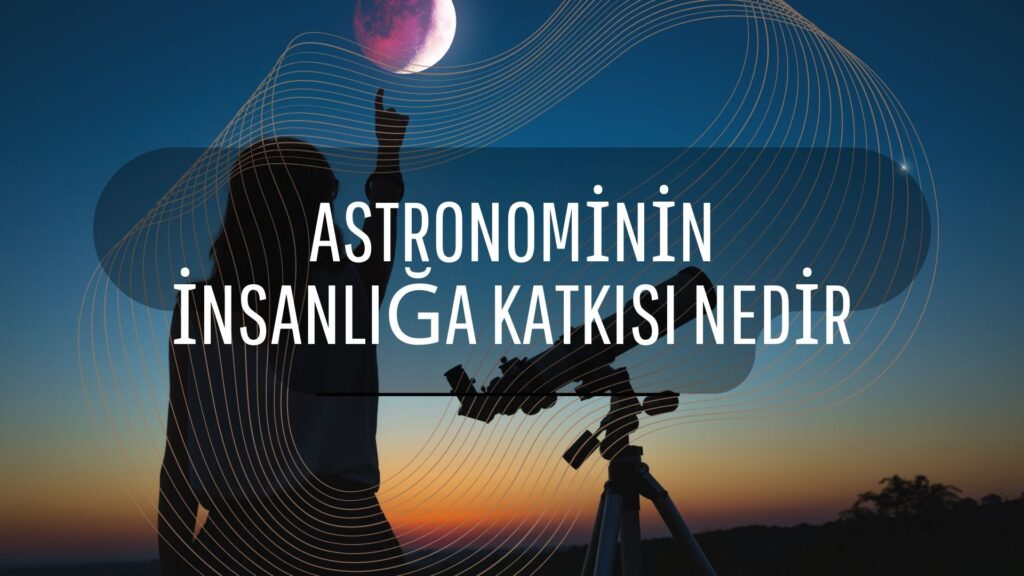Astronominin İnsanlığa Katkısı Nedir?
Tarih boyunca insanlar, uçsuz bucaksız okyanuslarda gezinmek için gökyüzüne bakmışlar, nereden geldiğimize, nasıl geldiğimize dair sorulara cevap aramışlardır. Copernicus, dünyanın evrenin merkezi olmadığını iddia ettiği zaman, bir devrimi tetiklemiştir. Polonyalı bilim adamı Nicolaus Copernicus, gezegenlerin güneşin etrafında döndüğünü öne sürmüştür. Tam olarak doğru olmasa da, gelecek de bilim adamlarının, insanlığın gök cisimlerinin hareketlerini ve dünyayı anlamaları için güçlü bir temel oluşturmuş ve katkı sağlamıştır.
Bu yeni dünya görüşüne toplumun ve bilim adamlarının uyum sağlaması bir hayli zaman almıştır. Yıldızlarda bulduğumuz temel elementlerin ve etraflarındaki gazın ve tozun, bedenlerimizi oluşturan aynı elementler olduğunun keşfi, insan ve kozmos arasındaki bağlantıyı daha da derinleştirmiştir. Açlık, yoksulluk, enerji ve küresel ısınma gibi birçok acil sorunla karşı karşıya kalmış bir dünyada yaşıyor olsak da, astronomi medeni toplumlar için eşit derecede önemli olan uzun vadeli faydalara sahip olduğu iddia edilmektedir.
Bazı araştırmalar fen eğitimine, araştırmaya ve teknolojiye yatırım yapmanın sadece ekonomik açıdan değil, genel olarak nüfus için kültürel ve dolaylı olarak büyük bir getiri sağladığını ve ülkelerin krizlerle yüzleşip üstesinden gelmelerine yardımcı olduğunu kanıtlamıştır. Bir ülkenin ya da bölgenin bilimsel ve teknolojik gelişimi, insani gelişme endeksi ile yakından bağlantılıdır. Buda eğitim ve gelir ölçüsünü belirleyen bir istatistiktir.
Nicolaus Copernicus kimdir?
Nicolaus Copernicus 19 Şubat 1473’de Polonya’da Thorn’da doğdu. Babası bir tüccar ve yerel yetkiliydi. Copernicus 10 yaşındayken babası öldü ve rahip olan amcası, Copernicus’un iyi bir eğitim almasını sağladı. 1491’de, şimdi Jagiellonian Üniversitesi, Krakow Akademisi’ne gitti. 1496’da, yasaları incelemek için İtalya’ya gitti. Bologna Üniversitesi’nde öğrenciyken Copernicus’un coğrafya ve astronomi konusundaki çalışmalarını teşvik eden bir matematik profesörü olan Domenico Maria de Novara ile birlikte çalışmalar yaptı.
İtalya’da geçirdiği süre boyunca Copernicus Roma’yı ziyaret etti ve 1503’de Polonya’ya dönmeden önce Padua ve Ferrara üniversitelerinde çalıştı. Amcası öldükten sonra daha önce görev yaptığı Frauenberg’e taşındı; bu süre zarfında astronomiyle ilgilenmek için daha fazla zamanı oldu. Copernicus’un büyük eseri ‘De Revolutionibus Orbium Coelestium’ (‘Göksel Kürelerin Devrimleri Üzerine’) 1530 yılında bitmiştir. ‘De Revolutionibus Orbium Coelestium’, 1543’ün başlarında yayınlandı ve Copernicus, aynı yıl 24 Mayıs’ta öldü.
Neden astronomi önemlidir?
Bu soruya cevap vermede katkıda bulunan başka çalışmalarda vardır. Lick Observatory direktörü Dr. Robert Aitken, 1933’de bilimi haklı çıkarmanın gerekliliğini ortaya koymaktadır. Son cümlesi duygularını şöyle özetlemektedir “ Astronominin misyonu insana evren hakkında daha fazla bilgi vermektir.” ifadeleriyle belirtmiştir. Daha yakın zamanlarda, C. Renée James bir makale yazmıştır. GPS, tıbbi görüntüleme ve kablosuz internet gibi son teknolojik gelişmeler için astronomiye teşekkür etmeliyiz” demiştir.
(Renée James, 2012). Radyo astronomi savunmasında Finley’de (2013) Dave Finley,“ Özetle, astronomi tarih boyunca teknolojik ilerlemenin temel taşı olmuştur, geleceğe katkıda bulunacak çok şey vardır ve tüm insanların hayal bile edemeyeceği kadar geniş ve heyecan verici bir evrende yaşıyoruz.” diyerek astronominin önemini vurgulamıştır.

What is the Contribution of Astronomy to Humanity?
Throughout history, people have looked to the sky to navigate the vast oceans, seeking answers to questions about where we came from and how we got there. Copernicus triggered a revolution when he claimed that the earth was not the center of the universe. The Polish scientist Nicolaus Copernicus suggested that the planets revolved around the sun. Although not entirely correct, the future has also created and contributed to a strong foundation for scientists to understand the movements of the celestial bodies and the earth for humanity .
It took a long time for society and scientists to adapt to this new worldview. The discovery that the basic elements we find in the stars and the gas and dust around them are the same elements that make up our bodies has further deepened the connection between man and the cosmos. Although we live in a world that has faced many pressing problems such as hunger, poverty, energy and global warming, astronomy is claimed to have long-term benefits that are equally important to civilized societies.
Some studies have proven that investing in science education, research and technology provides a huge return not only economically but also culturally and indirectly for the population in general, and helps countries face and overcome crises. The scientific and technological development of a country or region is closely linked to the human development index. This is a statistic that determines the level of education and income.
Who is Nicolaus Copernicus?
Nicolaus Copernicus was born on February 19, 1473, in Thorn, Poland. His father was a merchant and local official. His father died when Copernicus was 10, and his uncle, who was a priest, provided Copernicus with a good education. In 1491, he went to the Krakow Academy, now the Jagiellonian University. In 1496, he went to Italy to study the laws. While a student at the University of Bologna, he collaborated with Domenico Maria de Novara, a professor of mathematics who encouraged Copernicus’s work in geography and astronomy.
During his time in Italy, Copernicus visited Rome and studied at the universities of Padua and Ferrara before returning to Poland in 1503. After his uncle died, he moved to Frauenberg, where he had previously served; during this time he had more time to become interested in astronomy. Copernicus’ great work ‘De Revolutionibus Orbium Coelestium’ (‘On the Revolutions of the Celestial Spheres’) was finished in 1530. ‘De Revolutionibus Orbium Coelestium’ was published in early 1543 and Copernicus died on May 24 that same year.
Why is astronomy important?
There are other studies that have contributed to answering this question. Lick Observatory director Dr. Robert Aitken reveals the necessity of justifying science in 1933. His last sentence sums up his feelings as follows: “The mission of astronomy is to teach man more about the universe.” stated in his words. More recently, C. Renée James has written an article. “We have to thank astronomy for the latest technological advances such as GPS, medical imaging, and wireless internet.”
(Renee James, 2012). In his defense of radio astronomy, Dave Finley (2013) states, “In a nutshell, astronomy has been a cornerstone of technological progress throughout history, there is much to contribute to the future, and we live in a universe far more vast and exciting than any human could imagine.” He emphasized the importance of astronomy.